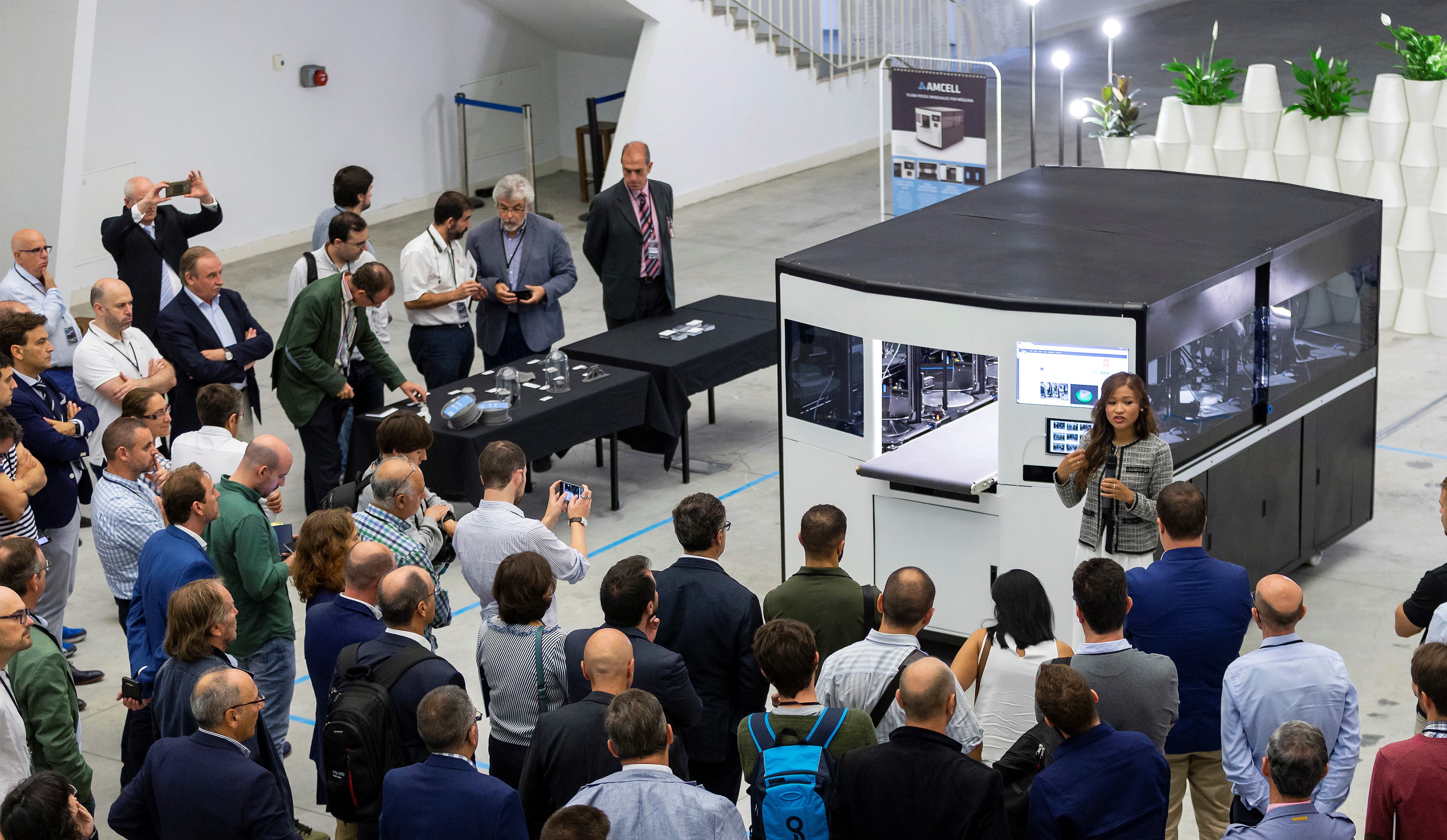Asturian startup Triditive aims to renew the fortunes of struggling SME heavy industry manufacturers with the development of the first automated additive manufacturing technology capable of mass-producing industrial components.
Known as AMCELL, the hybrid technology can operate with various materials and deliver 10,000 products per month, including industrial components, individual stainless steel shaping molds or various types of polymer. Operating 24/7, AMCELL's eight mechanical arms work simultaneously, managed by bespoke automatization software platform Evam that enables the machine to be controlled from a distance.
"It's very disruptive and can be remotely operated at any distance with no one present," Triditive's co-founder and CEO Mariel Diaz told CompassList at the recent 4YFN conference in Barcelona. "This is what we visualize tomorrow's factories to be like.
"At the moment, for example, the development team is operating the machines here in Spain from London. It is a qualitative leap in terms of the productive capacity of other technologies available now on the marketplace."
The startup is also looking for its next round of private financing. It received undisclosed amounts of financing from local initiatives like Gijón Municipality's "Future City Prototypes" and the European Commission's Horizon 20/20 program, as well as seed funding from angel investors in January.
"We are looking for smart money, not only financing but also support in industrial know-how to test new applications for the product," Diaz said.
"With this round, we want to scale rapidly because we have this disruptive machine that's been proven to work but we need to industrialize and look for an investor who wants to use additive manufacturing themselves."
Asturias' industrial infrastructure, decline
AMCELL's high productive capacity aside, its ability to print accurate prototypes in up to eight different materials simultaneously, without the requirement of post-production or assembly, also delivers faster times to market.
Also, the machine does not require expensive tooling or molds and can build infinite variability and refinement into products. The need for storage of stock is also dispensed with as production can be performed on demand to order. Controlling the machine remotely also means it is not necessary for staff to be on site when it is running. For SMEs, all this equates to considerable cost reductions compared to traditional production methods.
Triditive's roots lie in the industrial hub that is the northern region of Asturias, Spain's mining heartland and a center of its metallurgical and steel industry. The company started in Gijón as a spinoff from the engineering school of the University of Oviedo where Diaz, a 29-year-old Colombian mechanical and industrial engineer, and her co-founder and COO, José Camero, had been working on the concept and technology for four years. In 2016, the pair launched the startup to develop the technology and create a product ready for market.
Asturias's industrial heritage was vital to the establishment of Triditive, according to Diaz, who said the region's industrial infrastructure was essential for providing materials, a testing ground and customer base.
"Asturias has all the industrial materials and components we need, right on our doorstep. You don't find this in big cities in developed countries nowadays," Diaz said.
However, local SMEs have suffered from the gradual decline in heavy industry and the inability to digitize. Diaz believes her company holds the key for such businesses to thrive in the new industrial landscape of Industry 4.0.
"For many years the system of manufacturing had not changed. Many small manufacturers have been around for more than 50 years, and this is a way for them to digitize via our software," Diaz said.
Lower costs
For Diaz and Camero, Asturias's abundance of mid-sized manufacturers that use metal injection molding provided an eager testing ground for the technology. The pair worked directly with companies in the region, examining manufacturing needs that mainly involved small production runs of made-to-measure components.
Using their knowledge of mechanics and extrusion of material, they had already developed technology that worked with different materials and could produce industrial components. By working directly with local companies they found that although additive manufacturing was not necessarily new to many companies, the technology was out of their reach.
"The manufacturing costs don't match the market prices. And then, you could only produce a prototype, not a whole batch, because the technology didn't allow it," Diaz explained.
"We knew we had to match market prices, so that is when we decided we needed to automate our additive manufacturing technology to increase the productive capacity of the machines and to manage the process remotely. We also didn't want someone needing to attend to the machines 24 hours a day."
This realization led to the development of Evam, the software that enables AMCELL to be controlled remotely and to operate alone 24/7. Evam is an IoT platform that can be operated by mobile phone and optimizes AMCELL's performance by implementing orders and working to the earliest due date of a customer's order.
$27bn market
Since 2017, a year after its founding, the company has focused on testing its manufacturing capacities in Spain and, from 2018, on the product launch nationwide and in European markets with a strong manufacturing sector, such as Germany.
"The global additive manufacturing market was worth $7.3bn in 2017 and will be worth more than $27bn in 2023," Diaz said. "Not only are we part of that market, but also the metal injection molding market that in 2017 generated $3bn internationally. So AMCELL is also opening new doors for our clients too, giving them access to new markets."
Triditive's business model involves selling AMCELL and fulfilling orders for on-demand manufacturing batches, for which it has a waiting list of customers. It is collaborating with US metal injection molders Elnik Systems and others to further refine metal injection molding technology. It is also developing Bulkam, a parallel technology that would allow a significant scaling of volume production compared to current levels and would be incorporated into AMCELL.
In November 2018, AMCELL featured at Formnext in Frankfurt, the world's leading additive manufacturing exhibition additive manufacturing. Two months earlier, Triditive showcased its technology in Asturias at the region's first international event on additive manufacturing which attracted the attendance of players such as IAM3D Hub and Lortek.














